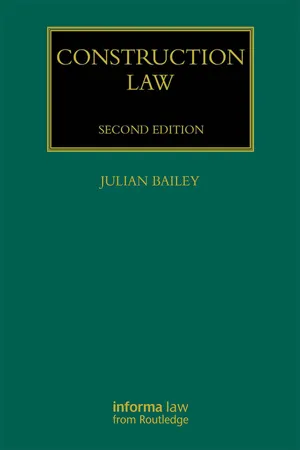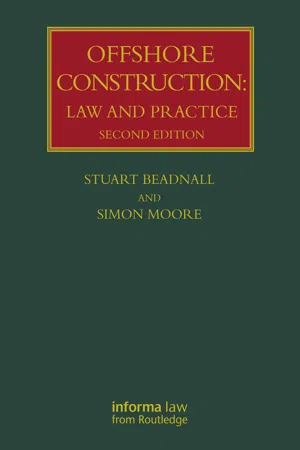Law
Anticipatory Breach
Anticipatory breach refers to a situation where one party to a contract indicates, through words or actions, that they do not intend to fulfill their contractual obligations. This occurs before the actual performance is due. The other party may then consider the contract terminated and pursue legal remedies for breach of contract.
Written by Perlego with AI-assistance
Related key terms
1 of 5
7 Key excerpts on "Anticipatory Breach"
- No longer available |Learn more
Carter's Breach of Contract
(2nd Hart Edition)
- JW Carter(Author)
- 2018(Publication Date)
- Hart Publishing(Publisher)
(c) Meanings of ‘Anticipatory Breach’ [7-08] Definition. Article 7.2 — Anticipatory Breach defined. An Anticipatory Breach occurs if a promisee validly terminates the performance of a contract for a repudiation or inability to perform prior to the arrival or expiry of the time for performance by the promisor. An ‘Anticipatory Breach’ occurs if a promisee validly terminates performance of the contract for a repudiation by the promisor prior to the arrival or expiry of the time for performance. Termination may alternatively be based on the promisor’s inability to perform. The election to terminate creates an ‘Anticipatory Breach’ of contract. 54 In most cases, Anticipatory Breach refers to conduct (or inability) prior to arrival of the time fixed for performance by the promisor, and it is convenient to assume that to be the position. However, in some contexts the perspective is expiry of the time fixed for performance by the promisor. For example, where a voyage charterer must complete the loading of a vessel within a certain time, an Anticipatory Breach occurs if the contract is validly terminated prior to the expiry of the lay days. 55 [7-09] Forms of Anticipatory Breach. The expression ‘Anticipatory Breach’ is not a happy one. 56 However, the cases recognise three forms, the common feature 51. Geogas SA v Trammo Gas Ltd (The Baleares) [1993] 1 Lloyd’s Rep 215 at 225. 52. See [6-42]–[6-45]. See further [7-16]. 53. See [3-36]. See also [3-42] (‘treating the contract as repudiated’). 54. See [3-12], [7-02]. See further [7-09]. 55. Universal Cargo Carriers Corp v Citati [1957] 2 QB 401 (see [9-19]). See also Norwest Holst Group Administration Ltd v Harrison [1985] ICR 668; Glencore Grain Rotterdam BV v Lebanese Organisation for International Commerce [1997] 4 All ER 514 at 523. - eBook - ePub
- Julian Bailey(Author)
- 2016(Publication Date)
- Informa Law from Routledge(Publisher)
conclusion, that when the time comes for it to fulfil its obligations, it will not do so or be able to do so. 62 An Anticipatory Breach is not, therefore, an “actual breach” of contract, in the sense that the promisor has not performed what it promised to do by the time it was required to do so, 63 but the commission of an Anticipatory Breach nevertheless is a species of breach of contract, because it involves conduct that contradicts the contractual promise made by a party. 9.20 An Anticipatory Breach of contract by a party relieves the other party from doing anything that was necessary on its part to enable the first party to perform the obligation it anticipatorily breached. 64 The consequential effect of this rule is that the party in breach is not able to justify the non-performance of the obligation in question on the basis that the other party (the putative innocent party) failed to do something that was needed to enable the first party to perform its obligation. 9.21 The application of the rule may be demonstrated by the following example. Suppose that a contractor enters into a contract to construct a building. The contract contemplates the owner supplying the contractor with a design, and, once supplied, the contractor will then construct the building. Until the contractor has been supplied with the design, however, it is not required to perform any construction work. But suppose that the contractor, before being supplied with the design, indicates that it is not willing to construct the building at all. In this situation, although the contractor’s obligation to commence construction work had not fallen due – because it had not been supplied with a design – the contractor would have committed an Anticipatory Breach of contract - eBook - PDF
Chinese Contract Law
Civil and Common Law Perspectives
- Larry A. DiMatteo, Chen Lei(Authors)
- 2017(Publication Date)
- Cambridge University Press(Publisher)
13 . 3 Anticipatory Breach AND DEFENCE OF INSECURITY 13.3.1 Anticipatory Breach 13.3.1.1 Relevant Law in Civil Law Jurisdictions and International Instruments As the legal notion of an Anticipatory Breach of contract has its roots in common law, 65 most civil law codifications have traditionally not contained an express provision about this issue. This continues to be true, for example, in Austrian law, 66 in Swiss law, 67 in French law, 68 and in most Latin American 64 Supra at 2.3.2. 65 Peter Huber, ‘Article 7.3.3’, in Stefan Vogenauer (ed.), Commentary, supra n. 33, para. 2; Ingeborg Schwenzer, Pascal Hachem, and Christopher Kee, Global Sales and Contract Law (Oxford: Oxford University Press, 2012) para. 47.137. 66 Under Austrian law, an unambiguous and definite refusal to perform is considered a non- performance; cf. Rudolf Reischauer, ‘§ 918’, in Peter Rummel (ed.), Kommentar zum Allgemeinen bu ¨rgerlichen Gesetzbuch, 3rd ed. (Vienna: Manz, 2000) para. 14. 67 Cf. Schwenzer, supra n. 34, paras 66.19, 67.09. 68 Simon Whitaker, ‘How Does French Law Deal with Anticipatory Breaches of Contract?’, 45 Int’l Comparative Law Quarterly (1996) 662. Anticipatory Breach: A Civil Law Perspective 335 contract laws. 69 In other civil law jurisdictions, 70 the situation has changed more recently, as law reforms have led to the inclusion of explicit rules on Anticipatory Breaches and their consequences. In this context, Article 72 CISG – a provision that in itself was inspired by common law 71 – occasionally served as a model. 72 Article 72 CISG provides: (1) If prior to the date for performance of the contract it is clear that one of the parties will commit a fundamental breach of contract, the other party may declare the contract avoided. (2) If time allows, the party intending to declare the contract avoided must give reasonable notice to the other party in order to permit him to provide adequate assurance of his performance. - eBook - PDF
- Yvonne McLaren, Josephine Bisacre, Yvonne McLaren, Josephine Bisacre(Authors)
- 2016(Publication Date)
- Goodfellow Publishers(Publisher)
This is known as Anticipatory Breach . Example of Anticipatory Breach : A famous singer has been booked to perform on the 31st December at the Edin-burgh New Year or ‘Hogmanay’ celebrations. On the 1st of December she states that she will not be coming. She is saying, in effect that on the 31st December she will be in breach of contract. The question then becomes, what remedies would be open to the promoter? The promoter will have two choices: (1) He could treat this as a repudiation of the contract by the singer and could thus rescind, on the grounds of material breach, and claim damages; (2) He could wait until the time of performance and see what happens. In this option of course there is no rescission and the contract is effec-tively kept ‘alive’. If the singer changes her mind and turns up to perform on the 31st December, it goes without saying that there is no breach of contract. Please note for an Anticipatory Breach to take place, the refusal to fulfil the obliga-tion must be definite by the party. If one party merely expresses doubts about his ability to perform, that is not Anticipatory Breach. If in such circumstances, the other party then attempts to rescind, that party could be liable for damages. Commercial Law in a Global Context 114 White & Carter (Councils) Ltd. v McGregor [1962] AC 413; 1962 S.C. (HL) 1 Facts of the case: White supplied street litter bins to local authorities on the condition that White could sell advertising space on the bins. One of White’s representatives called at McGregor’s garage to arrange a new advertising contract which was to last for three years. Terms were agreed with the garage manager and the contract was established. Later that day, McGregor telephoned White to cancel the contract. White chose to ignore this purported cancellation. They prepared the advertisements and displayed them for the three year period. - eBook - ePub
Offshore Construction
Law and Practice
- Stuart Beadnall, Simon Moore(Authors)
- 2021(Publication Date)
- Informa Law from Routledge(Publisher)
If one party makes it clear to the other that it cannot or will not perform essential obligations under the contract, or if it puts itself in a position where it is impossible to perform the contract, the other party is entitled to accept such ‘anticipatory’ breach as a repudiation, which entitles the innocent party to treat itself as being discharged from further contractual performance. 9 8 H G Beale, Chitty on Contracts (33rd edn, Sweet & Maxwell 2020). 9 Universal Cargo Carriers Corp v Citati (No 1) (n 7), at 403, where ‘an Anticipatory Breach of contract … was (1) renunciation by a party of his liabilities under it, or (2) impossibility of performance’. 13.16 The doctrine is not derived from a statute or codified law but from the general proposition that, in commercial circumstances, when a party agrees to perform a contract, it may be assumed that it is able and willing to do so. 10 Sometimes, statements of such intent and capacity are included in the express contract terms, but terms to the same effect may be implied into all commercial contracts. English law treats these as being conditions, namely, essential terms. This is illustrated by a leading case concerning carriage of goods. 10 See Baird Textile Holdings Ltd v Marks & Spencer plc [2001] EWCA Civ 274 at [59]–[61], where it was stated that where there is ‘an agreement on essentials with sufficient clarity’ then ‘an intention to create legal relations is normally presumed’. 13.17 In Federal Commerce and Navigation Co Ltd v Molena Alpha Inc (The ‘Nanfri’), 11 the Nanfri, along with sister ships the Benfri and the Lorfri, were chartered on three identical charterparties for six years to carry grain from the Great Lakes to Europe and return with steel. Freight was to be paid in advance and the bills of lading would be ‘freight prepaid’. The owners also had a lien on all cargoes and sub-freights - eBook - ePub
Comparative Contract Law
An Introduction
- Ermanno Calzolaio(Author)
- 2022(Publication Date)
- Routledge(Publisher)
Where the systems differ is over the case in which the party who is ultimately to pay indicates, before he has received the other’s performance and before the price is due, that he no longer wishes to receive performance. In the continental systems the creditor usually requires the debtor to pay. In English law the situation is a bit different, because a creditor is not normally able to make an unwilling debtor perform an obligation. For example, if the parties agreed that the creditor would paint the debtor’s house, but the debtor refuses admission to the house, in English law the creditor has no way of forcing the debtor to let him enter the house. Damages are the only option, but the plaintiff is expected to take reasonable steps to mitigate his loss, for instance by finding other work. However, the rule according to which the creditor has the duty not to aggrieve damages is generally accepted also in the civil law countries.8.2 Anticipatory Breach
When the parties agreed that performance should occur within a fixed time, is it possible for the performing party not to wait for the expiration of the agreed delay if it becomes evident that the other party will be unwilling to perform?The continental civil codes did not cover this topic explicitly. The general rule followed in France and Italy precludes the possibility to terminate a contract before the expiration of the agreed delay, even if the performing party is sure that the other party will not perform. In case of an express declaration by the other party announcing non-performance, this can only enable the creditor not to give notice to the debtor (see for instance Art. 1219 Italian civil code).However, beyond the strict rules fixed by the civil codes, the study of case law shows that judges are inclined to admit Anticipatory Breach. An interesting illustration of the case law approach is a case decided by the Italian Court of Cassation.22 - B.S. Patil, S.P. Woolhouse(Authors)
- 2019(Publication Date)
- CRC Press(Publisher)
10Breach of Contract
10.0 IntroductionA breach of a contract is failure to perform an obligation arising out of the contract. Where there is failure to perform an obligation, in whole, it is a total breach. When an agreement is broken only in part it is a partial breach. If a party announces, before his performance is due, his definite unwillingness or inability to fulfil the contract, he thereby admits he is guilty of a breach. The breach in such a case is called an Anticipatory Breach. Occasionally a party may deliberately incapacitate himself or render impossible the performance of his contract duties; or may so interfere to render performance by the other party impossible. Such tactics also constitute a breach of contract.Every breach of a contractual obligation confers upon an injured party a right of action. However, there are a number of valid excuses for non-performance of contractual obligations. An actionable breach of contract, therefore, occurs when a promisor, without sufficient excuse or justification, fails to perform in accordance with the dictates of his agreement.Further, there is a distinction between breach of a contract and termination of a contract. When a contract comes to an end it is said to be terminated. Breach of contract may constitute a means of contract termination. However, there are a number of ways other than a breach by which a contract can be terminated. Full and satisfactory performance by both sides is the usual mode. The other modes include:- Release under seal
- Rescission by consent of parties
- Accord and satisfaction
- Exercise of option given to a party in a contract to terminate under certain circumstances or events
- Rescission by a party on account of repudiation or non-performance by the other party
- Frustration or impossibility of performance
It may be noted that many common forms of breach of important contract conditions are dealt with in their appropriate places in different chapters in this book. The law applicable to some forms of breach of contracts not dealt with elsewhere in the book is considered in this chapter.
Index pages curate the most relevant extracts from our library of academic textbooks. They’ve been created using an in-house natural language model (NLM), each adding context and meaning to key research topics.






